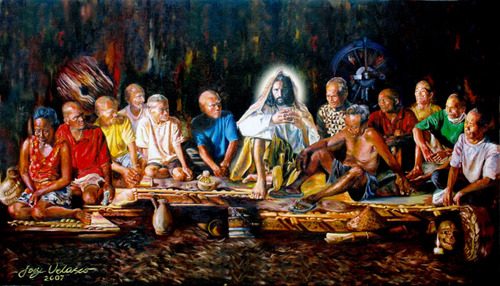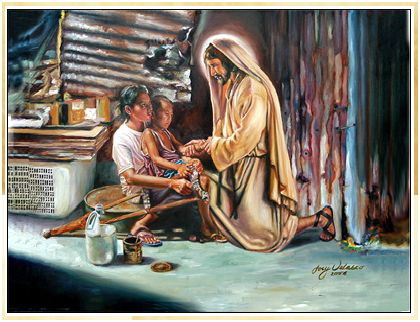
Joel Velasco’s painting
Deuteronomy 18:15-20
Psalm 95:1-2, 6-7, 7-9
1 Corinthians 7:32-35
/Mark 1:21-28
In the previous Sunday we’ve talked about the in-breaking of God’s Kingdom here on earth highlighted by narrative series of epiphanies (God made visible). In today’s gospel, God the Son, the actualizing principle in the Trinitarian dynamics of creation (according to St. Augustine), to our great surprise, can move everyone and everything into fruition by mere words without lifting a muscle. Last Sunday we’ve seen how the first four disciples obeyed Jesus leaving everything behind, family and livelihood, without question and joined him. Today, in the gospel, Jesus drove away evil spirit by verbal command. If we read on further, he also healed the sick, but mostly he was driving out demons, using only the power of his words. It’s just so amazing. Nothing like it has happened yet in the history of the world. Even our best imagined “super hero” does not have that ability.
But, how does the power of God’s word make a difference in our present time and situation? Certainly now many things, including physical and mental illness can be solved by the current highly advance science and technology. Humans can demolish a whole mountain single-handedly by just pressing a button. We have so much destructive power that we can jeopardize the earth’s viability as well as our very own existence. In contrast, God’s power heals and restores life. But, medical science can do this also. Therefore, the question now arises, do we still need God’s word power to reverse into health and life, the death-bound tendency of all things in the current world of business with its fanatic drive for production and consumption? Or, are we so doped and resigned to the current economic and political system producing a lot of money that we silently ignore the liberating and restorative power of God’s Kingdom?
Perhaps we continue to hear God’s word but we no longer value its moral and ethical imperatives. We have observed that the history of humanity if left to its own discretion without the loving regulation of its creator is always bound to ruin. Thus, I still believe that we need to listen to God’s word because it is not just restorative and transformative but it is importantly ethical. God’s word is where the ultimate principle and wisdom of life is based. We should not give up our eschatological expectation of a better world because God’s justice and righteousness will prevail ultimately. The gospel today says that that time for waiting has ended. The defeat of evil and the equivalent flourishing of life have started. However, no matter how happy we are to know this, there’s just too much distraction in the world that we must continue to fight through in order to hear and listen intently to the word of God.
In Deuteronomy 18: 15-20, Moses, felt that his earthly life was about to end, advised his fellow Israelites to watch out for a prophet to be raised up by God from among their own people. He will be like him, a spokesman of God. His words will be from God and accountable only to God. They should listen to him. However, Moses warned against listening to false prophets. Counterfeit ambassadors of God are rampant in the ancient times but far worse in the swarming fake news and keyboard trolls of today. A wicked King Ahab of Israel around 853 BC, had 400 prophets under his payroll. You could imagine how he was able to twist public opinion by that number in his favour. There are many fake prophets today and they are accountable not to God but to the politicians who hired them. Christians acquainted with different set of values must be keen enough to point the fact that we are being fooled. The irony of the situation is that these false prophets can poison our minds unhampered and can continue to live and prosper within our very own yard. In Moses time, they could have been stoned to death.
But how do we pin-down false prophets? The second letter of Peter (2:3) gives us a helpful tool for discernment. First, they are manipulative, using pleasing words but are heavily deceptive. The saying that “when it’s too good to be true, then it’s not true” applies here. Second, they will introduce a different source of salvation other than God. They will say, it is the “good news” of changing the constitution and the promotion of market economy that will save this country. In reality, they are saving their own ass to remain in control of oppressive and exploitative power. Finally the third, and the most obvious is arrogance and pride. There is a high level of self-righteousness and selfishness about their person. (2 Peter 1:5). They will force their opinion on us and silence our dissenting opinion to the point of killing us if needed be.
Psalm 95:1-7 warns us that if we hear the voice of God, we should not harden our hearts. If we only realize the repercussion of the truth that God is the owner and creator of all things and the provider of everything we enjoy in life, then, I don’t know why we should ignore and turn a cold shoulder towards God. Verse 7 says, “He is our God, and we his people; the flock he leads and pastures.” Again, the reason for our poor response to the call of God is because we have allowed ourselves to be enticed by the selfish values of this world.
The psalmist recalls how the Israelites were complaining to Moses about the lack of water and subsequently they quarrelled (the meaning of Meribah) among themselves. In this actuation, they were indirectly questioning (the meaning of Massah) the action of God freeing them from the slavery in Egypt. Sometimes we get so accustomed to living in slavery that freedom is no longer desirable as before. Instead of really living (becoming the best human being that we can ever be), we merely desire to survive.
The bible passage in 1 Corinthians 7:32-35 is about some people being heavily anxious over the issue of married and unmarried status in life. It’s such a big deal for some members of the Corinthian church under the close supervision of Paul. The underlying problem, if we read all through the first letter to the Corinthians, is the inordinate value they placed in the pursuit of wisdom and power which had its roots in the Hellenistic thinking. In the process of Christianization they continue to seek wisdom by accumulating spiritual influence through different forms of Gnosticism simply referred to as the gods of this world, and accumulation of power through acquiring a high social standing in society. This is the root of the constant bickering and quarrelling in the Corinthian church. Such superficiality and shallowness of faith is so much applicable for us today. These are narrow personal concerns that are often times at odds with the broad, inclusive and reconciliatory scope of the God’s Kingdom. Paul understood Jesus well when he knew that in order to be free and available to God is to shatter our constructed morals and fleeting existential obsessions.
Paul addresses the Corinthian’s questionable religious excitement by proposing a new understanding of wisdom and power. For Paul, it’s not about the acquisition or accumulation of anything in this world but the diametrical opposite of these. Power resides in freedom and the decision to empty ourselves in order to be filled with God’s values and concerns. To be married or not is out of the question. They are mere incremental matters to our existence. He was not however trying to undermine the fundamental value of family life. Jesus hates the social corrosiveness of private and exclusive family affairs. But, he honoured the wedding at Cana. He worked as tektōn (carpenter) at the construction site at Sephoris in order to support the meagre income of his family. Indeed we need a good family situation as a place of basic formation and nurture of future leaders of our nation. What is being asked of us is to be unrestrained by everyday duties in order to enter the path of lasting and meaningful salvation in Christ. We remain accountable for creating a wholesome family life but if it hinders us to expand and pursue the larger family of God, then there is no transformation. We’re stocked with the same old form of conservatism and self-indulgence.
In Mark 1:21-28, we are being taught by Jesus how to build the universal support system of the family of God. In this gospel it says that the time for waiting has ended. The defeat of evil and the equivalent flourishing of life have started. The benefit of education and health care are totally free of charge. Social services are being offered not for profit but for the pure intention of liberating and restoring health to mankind. Jesus is seen to have spoken with authority (proof that he is the sovereign power of all creation). But, his authority is not about dominance and prestige. God’s authority according to Leonardo Boff, is the authority to serve and love. Jesus’ understanding of power is dying on the cross and renouncement of all social status. Hence, what needs to be done now is to remain with God, because the present and future belongs to God.
Returning now to the issue of the Corinthians which is so much like us today in terms of overly busy, and success in life is measured in terms of material wealth acquisition and professional expertise, Paul advices that we should refrain from the culture of factionalism because this tendency is detrimental to the body of Christ. We are the body of Christ. Life in God is not a contest, the survival of the fittest as Darwin would have us believe. Thus, instead of competition for power and social status we should work for cooperation, and serve one another in humility and sacrifice. We should continue to care for the poor and the needy instead of being drawn to the philosophy of materialism. We should use our talents and gifts to build and nurture Christ’s body instead of preserving private property and watch others die of deprivation. If we can work for some levels of unity and reconciliation on the daily basis, then that is already a realized eschatology. The gap between heaven and earth would be closing in. So, from now on, let all that we do be done in love for the sake of others who are part of Christ’s body. ##
Geraldino B. Loyola Jr.
Redemptorist Lay Missionary




 Psalm 29:1-4
Psalm 29:1-4